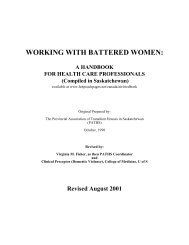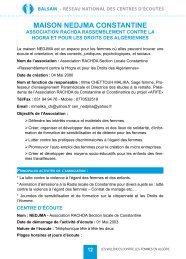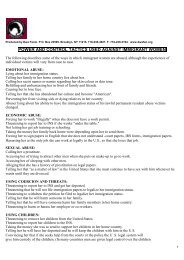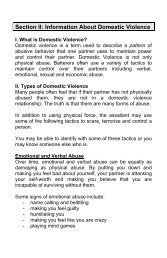Domestic Violence Counseling Manual - Hot Peach Pages
Domestic Violence Counseling Manual - Hot Peach Pages
Domestic Violence Counseling Manual - Hot Peach Pages
Create successful ePaper yourself
Turn your PDF publications into a flip-book with our unique Google optimized e-Paper software.
If a woman appears very nervous (e.g. tense, awkward, aggressive, or overly formal), adopt a<br />
relaxed and positive manner. Check on the woman’s comfort and keep questions to safe, easy<br />
topics until she is more at ease.<br />
2. Women who talk very little.<br />
If the woman keeps to very brief, non-committal replies, resist the temptation to talk more<br />
yourself. Do not succumb to the temptation of making long speeches that end in a closed<br />
question. Instead, ask easy, open-ended questions, encouraging any replies received.<br />
3. Women who talk too much.<br />
Talking too much is often a sign of shock or trauma. In these circumstances, it may help to let<br />
her tell you her story, listening as intently as possible, making sure you have understood all she<br />
has said and repeating it back to her, asking if you have got it right.<br />
4. Women who exaggerate.<br />
Some women may persistently overstate their injuries and complaints. Resist the temptation to<br />
deflate her. Instead try to focus on her feelings and why she finds what is going on so damaging.<br />
For you as a counselor, it is not really all that important to verify the truth of her claims, only to<br />
deal with the sentiment behind them. Remember, not all injuries are visible ones.<br />
5. Women who are too calm.<br />
Some women might seem too detached and calm when describing the situation. This is likely due<br />
to shock, or may be her way of coping with the trauma. Thus she may have (intentionally or<br />
unintentionally) deadened her emotions, so that re-telling the incident is done in a way that is<br />
devoid of emotion and eerily matter-of-fact. Living in an abusive situation can also desensitize<br />
women to the awfulness of what is going on, as it becomes for them an everyday norm.<br />
6. Women who are very angry.<br />
Some women may be very angry about what has happened/is happening to them. They may take<br />
this anger out on you. If this happens try not to be alarmed or take this personally. It isn’t you<br />
that they’re angry at. They are most likely projecting their anger at their abuser/perpetrator,<br />
themselves, or society in general onto you. This is actually good, as it indicates that they consider<br />
you a safe target. If they feel secure enough to get angry with you without fear of retaliation, they<br />
may also let you in once their anger subsides. Encourage them to express their feelings, but try<br />
not to let things get too out of control.<br />
7. Women who are hysterical.<br />
There are many reactions to trauma and reawakening painful memories can be too much for some<br />
people. Always keep tissues handy during counseling sessions and let the counselee know that<br />
it’s all right to cry. Her being willing to cry in front of you shows that she feels secure enough to<br />
48-56

















